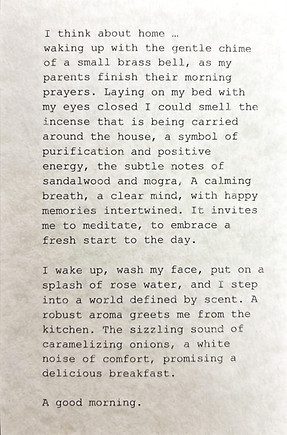Olfactory Dimension of Cultural Integration
Constructing a reflective space, a conversation with the memory, this work is an expression of the olfactory dimension of cultural integration. It takes the form of a multisensory installation composed of narratives from lived experiences and research informed by practitioners working on the themes of identity and migration. Exploring cultural identity through the sensory experience of smell, this work addresses personal encounters with cultural stereotypes about the olfactory profiles associated with a person’s ethnicity. It challenges Western norms and offers a new perspective for a deeper understanding of cultural diversity.





When I first moved to this country, not so long ago, I was looking for a place to live when I came across this very unexpected and unsettling cultural stereotype. During initial conversations with potential landlords and roommates, I repeatedly heard the phrase "the way Indians smell" due to the food they eat and their lifestyle. And this remark was often made before even meeting in person, setting off a series of reflections on identity, integration, and the persistence of these stereotypes in a globalised world. I started thinking about what are the "appropriate" smells in Western culture and how they are different from my culture. This reflection was not merely about personal hygiene but involved a deeper understanding of cultural perceptions and biases.It revealed how deeply these cultural practices influence my sensory experiences and how these experiences can be misinterpreted through the lens of another culture’s norms.
’
‘
It’s a space for ‘migrants of identity’ to relive and celebrate their lost identities and for others to understand the significance of these sensory profiles and accept this broader dimension of cultural integration and diversity.
With this work I want to ask - should individuals go beyond their comfort zones and adapt their lifestyles to mitigate culturally different olfactory profiles? Or should there be a broader acceptance and celebration of this diversity in a multicultural society?

%201_e.jpg)

Olfaction as a Mode of Communication
Olfactory communication has the ability to shift the role of the audience from being a passive to an active player, creating their own journey through the experience. It challenges the traditional modes of perception and engages the audience in a more multisensory and immersive way. Although the narratives behind this work are deeply personal and come from lived experiences, their mode of communication- smells, have a power to speak to the memory to evoke nostalgia and let the participant relive their own experiences, the lost identities.Much work has been done on the themes of identity and cultural integration but yet the sensory aspect remains overlooked. I have chosen scent to be the primary sense to accomplish this integration of self because scents evoke memories from childhood, reminiscent of a time when one used to envision their ideal self.
Journey From The Audience’s Point Of View
As soon as a person enters the room flushed with the robust aroma of coffee they are reminded of a social setting, a shared space eg. cafeteria often associated with waking up and a boost of energy. The smell of coffee symboizes an ‘appropriate’ smell in the western culture. As they come closer to the illustration they are greeted by the soft scent of rose, sparking curiosity, inviting them to search for the source of it. When they reach the braided hair, I expect the audience to interact with it to experience memories of childhood, innocence and a fresh perspective. As they navigate through the space they reach the scents of spirituality, memories of home to think about their identities that they lost when they migrated. The third narrative is associated with sharing their experiences with their loved ones conveying a sense of comfort and openness. With these narratives I want to challenge the Western belief of identifying olfaction as the sense that had to be repressed in order to achieve our human existence and identity. The Western Culture has evolved to appreciate the absence of smell. Going against the natural occurrence of smells from the body and outside to minimize this sense as much as possible.
This work aims to reintegrate scent into one's life to experience the vitality it offers.
